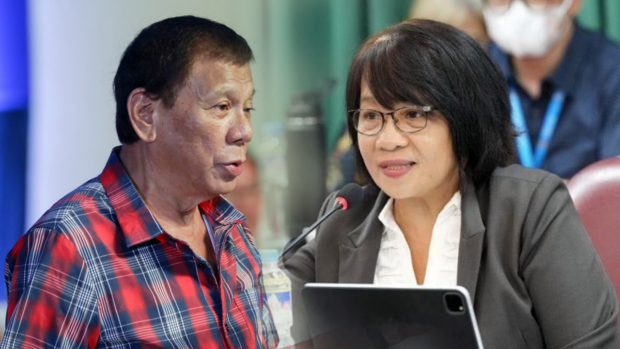House reps find Duterte’s tirades offensive, a serious attack – secretary general

Former President Rodrigo Duterte and ACT Teachers Rep. France Castro. (File photos from Malacañang and the Castro’s Facebook page)
MANILA, Philippines — A lot of members of the House of Representatives find the tirades made against by former President Rodrigo Duterte offensive and consider them a serious attack, Secretary General Reginald Velasco told reporters in an interview on Monday.
Lawmakers are puzzled why Duterte would call the House the most rotten government institution when it’s constantly subjected to checks and balances, even by the Commission on Audit.
Last Tuesday, Oct. 10, in his program “Gikas sa Masa, Para sa Masa,” (From the Masses, For the Masses) a nationally-televised program of Sonshine Media Network International (SMNI), Duterte accused House Speaker Ferdinand Martin Romualdez of having a pork barrel supposedly being distributed to lawmakers.
The former president also reportedly threatened ACT Teachers party-list Rep. France Castro for advocating the realignment of confidential funds.
‘Threatened’
On Monday, reporters asked Velasco if the lawmakers were offended.
“Well, it’s not just offended — threatened because he threatened a member [of the House],” Velasco said.
“And then it seems — if you watched the entire video — it seems that he said if the House and other agencies are not audited, he will call on businessmen, military — so this appears to be a people power.”
Reporters also asked if lawmakers considered Duterte’s statements a serious attack.
“Oh, yes, oh, yes,” he said. “Because why would you talk like that when such agencies like the Senate, House, Office of the President are being audited? There is no exemption — [not] even the judiciary. So why threaten people that you will call for a people power when there’s auditing?”
Velasco also said that he did not know if the President was serious when he issued the alleged threats against Castro. However, the House official said Castro haD the right to interpret the statements against her.
‘Serious death threat’
During the same SMNI interview, Duterte revealed that he advised his daughter Vice President Sara Duterte to just be frank about the purpose of the confidential funds, which is to supposedly kill communists like Castro.
This was after Castro pushed for the removal of the P500 million and P150 million confidential funds allotted to the Office of the Vice President (OVP) and Department of Education (DepEd), respectively — two agencies that the younger Duterte heads.
READ: House answers Rodrigo Duterte’s rant after OVP lost secret funds
“In that video, there really was a threat to kill — I think, if I’m not mistaken, to kill Congresswoman Castro. So that is painful for an active member of the HRep to be threatened just like that. Maybe he was joking or trying to impart another meaning, but the interpretation of Congresswoman Castro is that it’s a serious death threat,” Velasco said.
“There is no personal problem with the former president. The party leaders and congressmen said that they have been supportive of the [former] president. You know that during the time of COVID-19 all the legislation presented by the former president were approved by the HRep… So we do not have a problem with the former president, it’s only now because of that interview,” he added.
Several party leaders at the House have already condemned Duterte’s threats and asked him to stop insinuating harm against lawmakers.
Earlier, Quezon City 3rd District Rep. Franz Pumaren also urged Dutere to file cases if he truly believed that his allegations had a sufficient basis.
Last Oct. 10, the small committee assigned to resolve individual amendments to the proposed 2024 national budget or the General Appropriations Bill (GAB) announced that no confidential funds were given to the OVP, the DepEd, the Department of Information and Communications Technology (DICT), the Department of Foreign Affairs (DFA), and the Department of Agriculture (DA).
Six other civilian agencies’ confidential funds were also significantly reduced.
All in all, P1.23 billion in confidential funds were removed — accounting for around 0.6 percent of the institutional amendments made by the small committee.